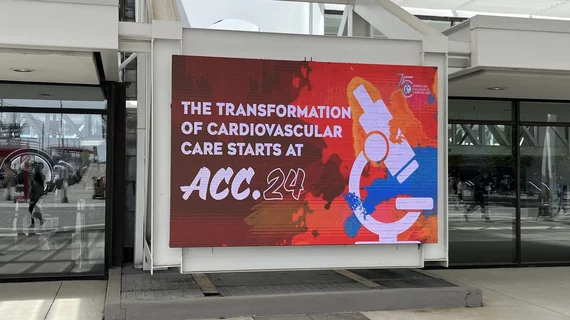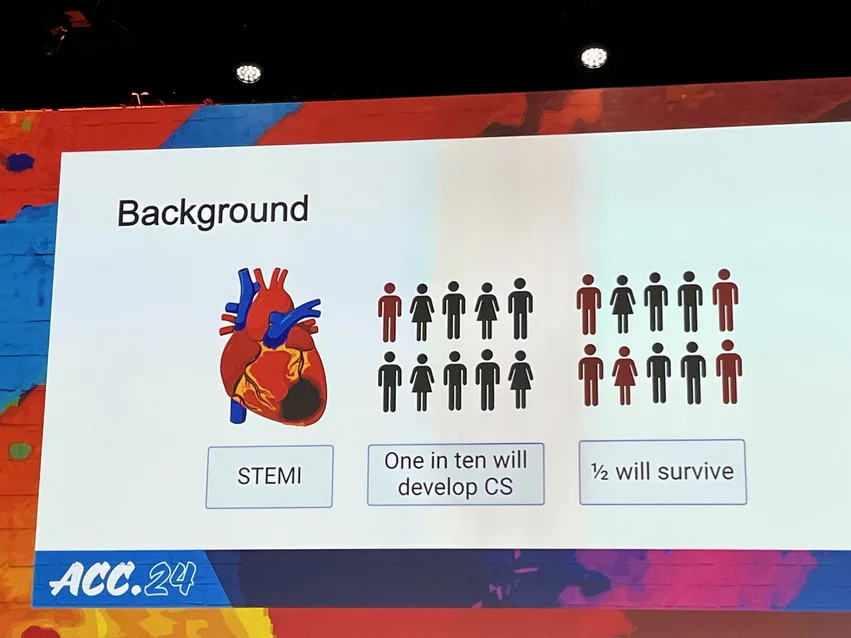ACC.24: Impella CP boosts survival for patients with STEMI-related cardiogenic shock
Mechanical circulatory support (MCS) with Abiomed’s Impella CP microaxial flow pump may improve survival among ST-segment elevation myocardial infarction (STEMI) patients in cardiogenic shock, according to late-breaking data presented at ACC.24, the annual meeting of the American College of Cardiology.
The full analysis was simultaneously published in the New England Journal of Medicine.[1]
Cardiogenic shock has challenged clinicians for years, often resulting in the patient’s death, and it is expected to become more common as time goes on due to an aging population. The DanGer Shock randomized trial explored the potential impact of treating STEMI patients in cardiogenic shock with the Impella CP before or after percutaneous coronary intervention (PCI). Patients were excluded if they had been resuscitated from out-of-hospital cardiac arrest and remained comatose or if they presented with overt right ventricular failure.
More than 350 patients from Denmark, Germany and the United Kingdom were enrolled during a 10-year period; 179 underwent MCS and 176 received standard care. Randomization occurred before PCI for 56.6% of patients, in the cath lab after PCI in 27% of patients and after departing the cath lab in 16.3% of patients.
Overall, the trial’s primary endpoint—all-cause mortality at 180 days—was seen in 45.8% of patients who underwent MCS with the Impella CP and 58.5% of patients who received standard care. A secondary endpoint—a composite of escalation to additional MCS, heart transplantation or all-cause mortality—was seen in 52.5% of patients in the Impella CP group and 63.6% of patients in the standard care group.
“This is the first time in a very long time that we have a positive study for managing cardiogenic shock,” lead author Jacob E. Møller, MD, PhD, a professor in the department of cardiology at Odense University Hospital in Denmark, said. “I think this will be a routine device that will be used in these desperately ill patients.”
Adverse events something to watch
One notable takeaway from DanGer Shock was the high number of adverse events associated with use of the Impella CP. The study’s composite safety endpoint—severe bleeding events, limb ischemia, hemolysis, device failure, worsening aortic regurgitation—was seen in 24% of patients treated with the device and 6.2% of patients in the standard care group. The Impella CP was also linked to an increased risk of other complications such as renal replacement therapy and sepsis.
“The rate of complications is a true concern,” Møller said when discussing his presentation with ACC.24 panelists. “That is something we need to take very seriously.”
Another perspective
Sunil V. Rao, MD, an interventional cardiologist with NYU Langone Health and past president of the Society for Cardiovascular Angiography and Interventions, shared his thoughts on DanGer Shock in an editorial for the New England Journal of Medicine.[2]
“The results of the DanGer Shock trial are clear in that the microaxial flow pump reduced mortality among selected patients with AMI-related cardiogenic shock,” Rao wrote. “However, given the rapidly evolving nature of MCS use, other unresolved issues remain. These include the timing of microaxial-flow-pump placement (before primary PCI or after opening the infarct-related artery), the incorporation of shock protocols or a ‘shock team’ as a standardized approach and the combined use of the microaxial flow pump with other mechanical circulatory support such as venoarterial extracorporeal membrane oxygenation.”
Rao also praised the “patient and persistence” of the trial investigators, highlighting the full decade it took to enroll the necessary number of patients.
“Despite the long duration of trial enrollment, mortality from AMI-related cardiogenic shock had not changed appreciably during that period.,” he wrote.


